Liam Neeson Talks Working With A Different Joe Carnahan On The Grey
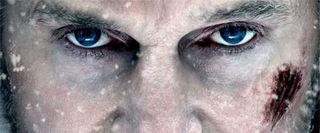
The Grey isn’t the first movie that Liam Neeson has done with director Joe Carnahan. Back in 2010 the duo worked together to make The A-Team a fun action romp in which Neeson played the classic role of John "Hannibal" Smith. The Grey, however, is a completely different beast (and I’m not talking about the wolves). And working on such a different film required a different kind of director, a director that Joe Carnahan had to become.
I recently had the pleasure of participating in a roundtable interview with Neeson to discuss not only working with Carnahan on The Grey, but also the responsibility that comes with being a lead actor, the metaphorical ideas that the movie presents, and what it says about modern masculinity. Read on!
How well would you do in those conditions if you were thrown into them?
I’d curl up and die. Yeah, especially 40 minus degrees, which it was our first week – minus 40 degrees. And I remember thinking, I don’t know if you remember that scene where the airplane malfunctions and I have to sit up in the snow, but that was our first day, and I thought, we’re never going to finish this film. It’s impossible. And cameras were malfunctioning and equipment wasn’t working, and I thought, “this is ludicrous.”
But did it trigger something very primal in you?
Well, the script kind of did – the script read like a 19th Century epic poem for me, something like “The Ancient Mariner” or something. And also the little boy in myself; I just thought it would be great to be out with a bunch of guys on a cliff face or a rock face and doing manly things.
It’s becoming an annual event for us to get to see you in January and February in these very physical roles. What’s inspired you to take these films on in such a quick succession? Is it doing one successfully and getting offered more?
CINEMABLEND NEWSLETTER
Your Daily Blend of Entertainment News
That’s it, essentially. You know, Taken came out four years ago, three years ago, and they’re offering me a lot of these action films, and I think, my knees can maybe hold out another year, but that’s it.
But you’re going to ride it out?
I’ll ride it out for at least a year, yeah. We’re doing Taken 2 at the moment, and it’s a lot of fighting and killing and stuff.
Was the Joe Carnahan who directed this film the same one who you made The A-Team with?
Kind of, pretty much. I think The Grey was very much his love child, so I think he was more sensitive than he was on The A-Team. But he’s an alpha male, you know? He’s a throwback to those directors from the 30s and 40s, I think – Hathaway, Howard Hawks, John Ford. He’s a real throwback to those guys, you know, and I love that in a director. And Katherine Bigelow is the same; she’s the governor you know? And I love having a leader. And especially on a shoot like this, these conditions; you need someone who’s in charge and knows what they’re doing.
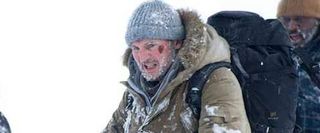
How did your initial read of the script compare to how it turned out?
After the initial draw of reading it and genuinely kind of falling in love with it, I then thought, how the fuck is he going to shoot this thing? We have extremes of temperature, winds and stuff, and then wolves and raging rivers and stuff, it’s like, how’s he going to shoot this stuff in 40 days? But he did – he did it.
You are the leader of this ensemble, however. What sort of responsibility did that place on you?
I don’t know. I just like to be on time every morning, not keep a crew waiting or keep my fellow actors waiting; I try to set the standard in that, like if I have to be on the set at 7:30 then I’m on set at 7:30. I’m ready, you know? I’m a big stickler on that – you don’t keep people waiting. Certainly not movie crews. And it’s an unfortunate thing in our business that we’re constantly hearing stories of people misbehaving, you know, and I hate it because it reflects on me; that’s my craft, it’s my profession, and we’re professionals. So that’s what I do, and I just made sure, okay, I’m the lead actor, so I’ll be on time and be the first out in the snow if I have to be, and whatever.
The characters in these action movies you appear in are all alpha males. Is that something you relate to in real life?
No. That’s why I love Carnahan – he’s a leader, and I’m so not a leader. I can play them, but in life, I’m not one.
So is it very satisfying to play them?
Yes – it’s great. It’s great fun, because I know that I’m the opposite.
How much did the film’s themes and even the shoot itself force you to come to terms with your own mortality?
Well, when you reach the age of 59 and a half, you do reflect a lot on why you’re on this planet, and what we’re doing, you know? It’s a constant – it is with me, anyway.
Is that partly why you connected so deeply to the material?
Maybe, maybe it was, yeah. I wasn’t consciously, but I knew certainly the emotional range of this guy, I could access [it] with a certain amount of ease. And I don’t say that as a brag, it just was a comfortable fit.
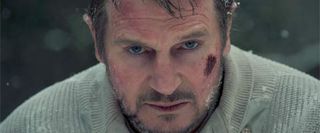
What do you hope the audience takes from this film?
I hope there’s a bit of a joyride to it, but that it’s a good, thrilling film. There’s an element of horror in it, and also an element of spirituality in it. But that it’s a good ride! I know that’s a cliché, but hopefully they’ll be intrigued by it and it’s not your normal survival movie, you know?
Because you can’t play a theme, how do you juggle those larger metaphorical ideas as you’re dealing with the practicalities of the character and the environment? Do you just deal with each day pretty simply?
Yeah, pretty simply. And certainly when I read the script, and re-read it, I could see there were those elements there. And I love Greek mythology, and there’s a mythological element to this film, you know? But yeah, the rest of it, I would leave up to Joe, and try and play each scene for the truth of it, and all of the cast as well.
Is it easier to find the truth of a scene in films like this one, that are more realistic, or ones that are more fantastical?
Um, well certainly in the fantastical ones you still have to make them real. Like we just finished reshoots on Wrath of the Titans, and I’m playing Zeus and my buddy Ralph is playing Hades, and we’re saying fantastical things to each other and about each other. But you still have to try and make it real within that convention, within that genre. But sometimes it’s easier than other genres, and sometimes it’s not; it depends on the writing.
Sam Worthington recently said there were things in Clash of the Titans he wasn’t happy about that he wanted to fix in Wrath. Were there things you were unhappy with that you wanted to sort of correct or explore differently?
Those Greek mythology stories are endless, there’s so many variations of them, and I thought it would be interesting if they explored a bit more of Zeus and my relationship to Perseus, or Sam, and to my brother Hades, Ralph’s character. So we’ve done that to a larger extent in this next one, with all of the thrills and spills to a movie like that has to have with various monsters and stuff.
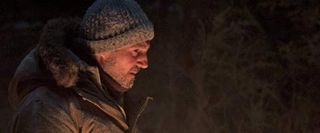
How did you prepare yourself for this film in terms of the conditions and physical challenges?
I’ll tell you what I did. I remember seeing this documentary from a couple of years ago about this crazy Brit who swims from iceberg to iceberg in Antarctica. You know, you find these people sometimes, and he was this London guy, and he started preparing for these swims by standing under freezing cold showers for ten minutes, 15 minutes every morning, and I did that. I got up to seven minutes most mornings, and it actually works; it immunizes your body, and your body starts getting used to the cold. It really works. So that was my preparation.
What was the most memorable scene in the movie for you to shoot?
I don’t know about that. I just loved being with the guys. There was a campfire scene where we get to tell our stories, and I liked doing that. They’re a fantastic bunch of actors, the best guys in the world.
How about working with the wolves?
Nasty fuckers, you know? No, I didn’t work with any wolves – it was animatronics, puppetry. But they were vicious, and they weren’t real, they were supposed to be kind of mythical, you know what I mean? Like the shark in Jaws – yeah, it’s a great white, but it’s bigger than a great white, and it’s got a mythic proportion to it. So we tried to do the same with these wolves.
Because of the mythical aspects of the story, did you find yourselves discussing those aspects off set?
Sometimes, yeah. I mean, there were no trailers on the locations we were at. Between setups, we’d share this cat, this vehicle with caterpillar tracks for that terrain, and we’d all share that. And we’d talk about – a lot of dirty jokes, we’re a bunch of guys. But occasionally we’d dip into the metaphysics and we became very close – very good friends.
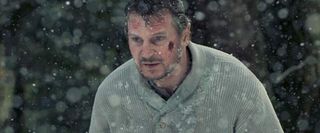
The movie touches on a lot of personal fears. What’s your biggest fear? Are you scared of flying, or heights…?
I’m scared of heights. Heights give me a real – you know that iconic black and white photograph of those guys sitting on a girder having their lunch break? Describing – even thinking about that now is making me [uncomfortable]. I get dizzy on a thick carpet; heights just don’t do it for me. That’s a big fear, actually. I can’t go on roller coaster rides with my kids, I never could. “Dad, please! Dad, please?” Sorry, I love you to death but I’m not getting on that thing. I couldn’t do it.
Flying is okay?
Flying is alright, yeah.
They said you had to get on a plane the day after you shot the plane crash?
Oh, I know. I know. We were all [whistling]; nobody’s talking about airplanes as this thing is [shaking]. And then of course, once we got up in the air, everyone was like, “whew, okay!”
This is about very masculine men, but we live in an era of metrosexuality. What does this film have to say about modern masculinity?
Wow. I knew it would be you, I just knew it coming into the room. You tell me, what do you think it says about modern masculinity?
It certainly explores the range of what it means to be a man now.
You think? Well, I think in general it does touch on man’s general fear – I don’t think for this generation, but for my generation and my father’s generation, of difficulty in accessing emotion and then being able to talk about it. I think it certainly touches on that, and these guys, these characters in this film find it very, very hard to relate certainly to themselves and to one another. Which is one of the nice things about the film, that they do, in a way, they do share in a very primitive, basic way.
It seems like once they tap into that primitive feeling, they’re more easily able to communicate emotionally with one another.
Yeah, yeah. Because there’s nothing to hide behind anymore; it’s us versus these elements. Frank’s character, he plays it beautifully; he pretends he’s got this machismo, but I think ultimately it breaks down, the way it has to. And then his real spirit comes out, and it’s fantastic – and he plays it beautiful too, you know?
It’s like in order to reach that part where they can genuinely communicate, they should access this much more masculine side – that it’s a simpler thing.
Well, I guess we’ve all experienced that, right? Sometimes you have an emotion or something inside yourself that you can’t talk about, and somebody taps you in a different way, or sometimes even a complete stranger, suddenly you open yourself up and you’re telling a complete stranger your life story. And then the relief you feel when you’ve shared whatever that thing is, and you think, God, that was so easy to do.
Because the first Taken was a surprise hit, do you feel more empowered, or more pressure?
You’ll have to wait and see. But there’s a few thrills.

Eric Eisenberg is the Assistant Managing Editor at CinemaBlend. After graduating Boston University and earning a bachelor’s degree in journalism, he took a part-time job as a staff writer for CinemaBlend, and after six months was offered the opportunity to move to Los Angeles and take on a newly created West Coast Editor position. Over a decade later, he's continuing to advance his interests and expertise. In addition to conducting filmmaker interviews and contributing to the news and feature content of the site, Eric also oversees the Movie Reviews section, writes the the weekend box office report (published Sundays), and is the site's resident Stephen King expert. He has two King-related columns.
Most Popular






